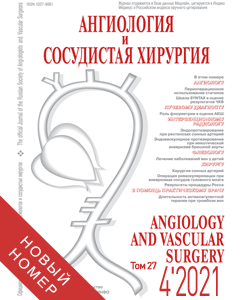Journal «Angiology and Vascular Surgery» •
2019 • VOLUME 25 • №3
Antithrombotic therapy after venous stenting
Ignatyev I.M.
Department of Cardiovascular and Endovascular Surgery, Kazan State Medical University of the RF Ministry of Public Health, Kazan, Russia
Presented herein is a literature review considering the problems of using antithrombotic therapy after venous stenting. Described herein are the literature data according to which the authors give preference to anticoagulant therapy (low-molecular-weight heparins, vitamin K antagonists, direct oral anticoagulants). This is followed by considering the problems of duration of treatment depending on various clinical situations. According to the presented data, the problem of prescribing disaggregants in a combination with anticoagulants after stenting of veins remains disputable, finding however many supporters.
Analysed in the article are the results of the first International Delphi Consensus dedicated to antithrombotic therapy after venous stenting. Participating in the study were 106 independent experts practicing stenting in 78 centres of 28 countries of the world. Nonthrombotic iliac vein lesions, having appeared as May-Thurner syndrome due to extravasal compression and residual obstruction after thrombolysis, as well as the presence of postthrombotic syndrome were the main «scenarios» for our study.
The study resulted in working out provisions considering the policy of antithrombotic therapy in various obstructive lesions of deep veins. According to the presented data, anticoagulant therapy is preferable during 6-12 months after stenting in nonthrombotic iliac vein lesions. Low-molecular-weight heparins appear to be a method of choice in treatment during the first 2-6 weeks. Life-long administration of anticoagulants is recommended after multiple deep vein thromboses. Discontinuation of anticoagulants after 6-12 months is indicated after venous stenting in one episode of deep vein thrombosis. No consensus was achieved regarding the role of prolonged disaggregant therapy.
Underlined in the article is the importance of a meticulous individual approach to choosing optimal policy of antithrombotic therapy and determining therapeutic policy together with a haematologist.
KEY WORDS: venous stenting, nonthrombotic lesions, post-thrombotic syndrome, vitamin K antagonists, direct oral anticoagulants, disaggregants, Delphi consensus.
P. 187
ARCHIVES MAGAZINE
2021 (Vol.27)
2020 (Vol.26)
2019 (Vol.25)
2018 (Vol.24)
2017 (Vol.23)
2016 (Vol.22)
2015 (Vol.21)
2014 (Vol.20)
2013 (Vol.19)
2012 (Vol.18)
2011 (Vol.17)
2010 (Vol.16)
2009 (Vol.15)
2008 (Vol.14)
2007 (Vol.13)
2006 (Vol.12)
2005 (Vol.11)
2004 (Vol.10)
2001 (Vol.7)
2000 (Vol.6)
1999 (Vol.5)
1998 (Vol.4)
1997 (Vol.3)


